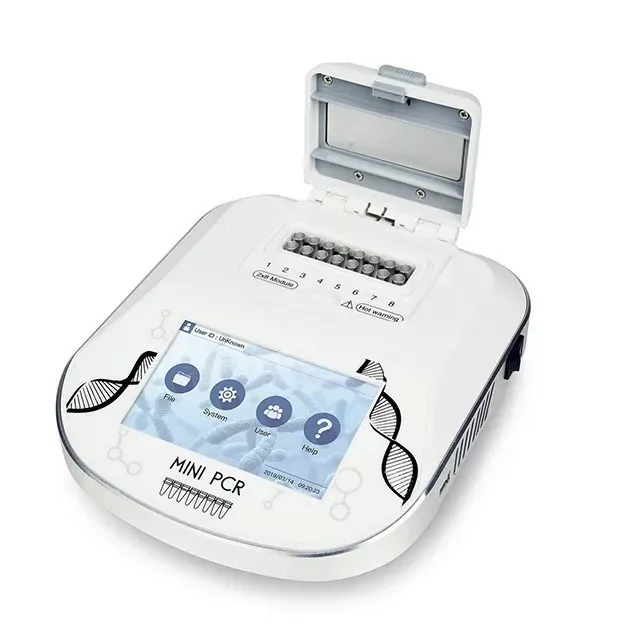Maximize Your PCR Efficiency with a High-Performance Thermal Cycler KTC/A/16
In the field of molecular biology and genetic research, polymerase chain reaction (PCR) is an essential technique for amplifying DNA sequences. Thermal Cycler KTC/A/16, also known as a PCR machine, is the cornerstone of this process, providing the precise temperature control necessary for the cyclic reaction stages of PCR. Whether you’re conducting research in genetics, biotechnology, or medical diagnostics, a reliable thermal cycler is indispensable for achieving accurate and reproducible results. In this comprehensive guide, we will explore the key features, benefits, and applications of thermal cyclers.
What is a Thermal Cycler?
A thermal cycler is a laboratory instrument designed to amplify DNA segments through the PCR process. It precisely controls the rapid heating and cooling cycles required to denature DNA, anneal primers, and extend new DNA strands. Modern thermal cyclers offer programmable temperature settings, enabling researchers to customize and optimize protocols for a wide range of applications.
Key Features
- Precise Temperature Control: Thermal cyclers provide accurate and consistent temperature regulation, crucial for the success of PCR experiments.
- Multiple Sample Capacity: Equipped with sample blocks that can accommodate multiple PCR tubes or microplates, facilitating high-throughput analysis.
- Programmable Cycles: Allows users to customize and program temperature cycles and durations to suit specific experimental protocols.
- Gradient Functionality: Many thermal cyclers feature gradient capabilities, enabling the simultaneous testing of different annealing temperatures to optimize PCR conditions.
- Fast Ramp Rates: Modern thermal cyclers offer rapid heating and cooling rates, reducing overall reaction time and increasing efficiency.
- User-Friendly Interface: Intuitive touch screens and software make it easy to set up and monitor PCR runs, even for complex experiments.
- Connectivity and Data Management: Some models offer connectivity options for data export and integration with laboratory information management systems (LIMS).
Benefits of Using a Thermal Cycler
- Enhanced PCR Efficiency: Precise temperature control and rapid cycling reduce reaction times and improve amplification efficiency.
- Reproducible Results: Consistent cycling conditions minimize variability and ensure reliable, reproducible results across experiments.
- Versatile Applications: Suitable for a wide range of PCR applications, including cloning, sequencing, genotyping, and gene expression analysis.
- High-Throughput Capabilities: Multi-sample capacity allows for the simultaneous processing of numerous samples, increasing laboratory throughput.
- Cost-Effective Solutions: Reduces the need for repeated experiments by providing accurate and reliable results, optimizing reagent use and resource allocation.
- Advanced Research Capabilities: Supports complex PCR protocols, including real-time PCR and multiplexing, enabling cutting-edge research and discovery.
Applications of Thermal Cyclers
- Genetic Research: Amplifies DNA for sequencing, cloning, and analysis, facilitating the study of genetic variations and functions.
- Medical Diagnostics: Detects and quantifies pathogens and genetic markers, aiding in disease diagnosis and personalized medicine.
- Biotechnology: Supports the development of genetically engineered organisms and the production of recombinant proteins.
- Forensic Science: Analyzes DNA samples for criminal investigations, providing evidence for identification and legal proceedings.
- Agricultural Research: Studies plant genetics and improves crop varieties through genetic analysis and marker-assisted breeding.
- Environmental Science: Detects and monitors microbial populations in environmental samples, contributing to ecological studies and conservation efforts.
Choosing the Right Thermal Cycler
When selecting a thermal cycler, consider factors such as sample capacity, temperature accuracy, ramp rates, and specific application requirements. Reviewing product specifications and consulting with manufacturers can help you choose the best thermal cycler to meet your needs.
Conclusion
Thermal cyclers are essential tools for accurate and efficient DNA amplification in molecular biology and genetic research. Their advanced features, precision, and versatility make them indispensable for professionals in research, diagnostics, and industry. Investing in a thermal cycler ensures high-quality results, enhancing productivity and supporting groundbreaking discoveries.
For expert advice on selecting the best thermal cycler for your needs, contact our specialists today.





Reviews
There are no reviews yet.